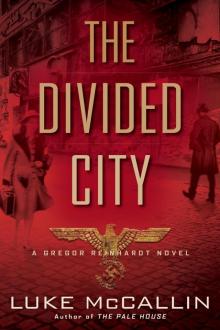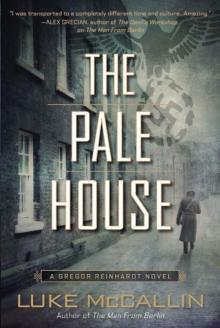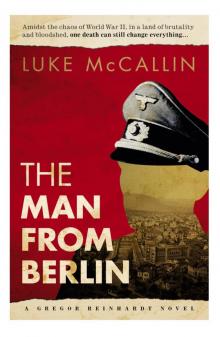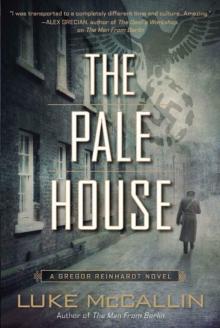- Home
- Luke McCallin
The Man from Berlin Page 5
The Man from Berlin Read online
Page 5
Moving suddenly, he began casting around, looking at the ground, looking up at Vukić’s house, and Hofler’s. A car, she had said. It would have been parked around about… there. Between those two trees, there was space for a car to wait. He began walking slowly, looking at the ground, unaware of the two policemen who watched him curiously. Up, then down, then up again. He leaned closer. Maybe something. Maybe nothing. Sometimes you get lucky.
There.
There was a crunch of feet behind him. He knelt down, picked something up with his handkerchief, and turned around. Padelin was standing behind him, and his men were climbing into their cars, all but the guard on the door. ‘I am ready. If we shall go now?’
‘Look at this,’ Reinhardt said. ‘Claussen, you too.’ The three of them looked at what he had found. It was a hollow tube of what looked like cardboard, about the length of a finger, squeezed flat at both ends. Reinhardt raised it and sniffed, and wrinkled his nose at the acrid odour it gave off. Padelin sniffed; Claussen just looked at it.
‘Papirosa,’ Claussen said. ‘About the cheapest cigarette you can get.’
Reinhardt nodded, remembering. ‘The Russians used to smoke them in the trenches. The smell was so bad, we could smell them across no-man’s-land.’
‘We captured a stock of it, once,’ said Claussen. ‘After Kowel. We smoked it until we were sick.’
Padelin stood impassively throughout this impromptu reminiscence as Claussen began walking backwards, searching the ground. Reinhardt smiled up at the detective. ‘This is what the old lady smelled,’ he said. ‘Do you have something we can put this in?’ Padelin turned and snapped something at one of his policemen, who came running up with a small paper envelope. Reinhardt slipped the papirosa in and flapped his handkerchief before folding it up.
‘Here,’ said Claussen. ‘Here’s another one.’
‘I’ll take that. You never know,’ he said, wrapping it in his handkerchief, and climbed into the back of the car with the detective. Claussen and Hueber got in front, and they began the journey back into town. It was just coming up to eleven o’clock.
5
It was very warm now, the sun smouldering like a hot stone in a sky washed almost white, and Reinhardt was thankful for the kübelwagen’s open top and the breeze through his hair as Claussen swung back through Ilidža and onto the main road back into the city. The road was busier, and they fell in with a military convoy moving east. Their pace slowed, the air fouled by the fumes of the trucks ahead. Claussen began to fidget and curse behind the wheel, swinging the car out to try to overtake, but after a while he gave up. Too many trucks, not enough room.
‘If you like, we can stop just ahead,’ said Padelin. ‘There is one small village that has sometimes good coffee.’ Claussen looked at Reinhardt in the mirror, raised his eyebrows. Reinhardt nodded and realised he was hungry. Padelin leaned forward and pointed to the right, where a small road left the main one. A pair of Feldgendarmes were on traffic duty there, but they let them pass when they showed their identification. The kübelwagen bumped along the dirt road, chased by a three-legged dog for a while through the centre of a small village of white houses. Padelin stopped them outside a small café next to a sluggish stream. A couple of tables sat in the shade of an overhanging roof.
Climbing out, Reinhardt could still see and hear the road and the convoy that ran down it. Padelin went inside while Reinhardt took off his cap and sat at one of the tables. Claussen and Hueber took another. There seemed to be no one in the street, or the village, other than the dog that now lay panting under the kübelwagen. He could feel the eyes, though. Padelin came back out and sat next to him, draping his jacket over the other chair. A waiter followed him out with glasses of water.
‘There is burek and tomatoes,’ said Padelin, as he downed his glass and gestured for another.
Reinhardt took his glass a bit slower, putting his elbows on the table. ‘So, tell me now, what is it about Marija Vukić?’
Padelin sipped from his new glass of water and licked his lips. His eyes narrowed as he looked out into the sunlight. ‘She was like a movie star. Very famous for us. Her, and her father – Vjeko Vukić – they were with the Party from the beginning, when no one knew us, no one wanted to be with us. She studied filmmaking in Italy and in Berlin.’
‘She travelled a lot?’ The food arrived. The burek was minced and fried meat rolled in pastry, served with glasses of yogurt. Few things were better, Reinhardt had found during his time in Yugoslavia, than burek for a hangover. Padelin took his apart in his big fingers, shoveling it piece by piece into his mouth.
‘I think yes, she did. Even before the war. I always would read her reports in the papers and see her films.’ Reinhardt saw it in his eyes, the echo of a teenage crush. ‘She would get in trouble, sometimes, with the authorities before the war. About the need for a Croatian state, and freedom from the Serbs. It never stopped her from saying or writing what she wanted, though.
‘She would do this, how do you call it… they show films, give books and magazines. Welfare work?’ Reinhardt nodded. ‘Right. She would organise films, and interviews with even the lowest soldiers. She would distribute magazines and newspapers, and the mail if it was there, she would give it to the soldiers. If you were lucky, you got a kiss. You can imagine, she was very, very popular with the soldiers.’
‘Well, I never got one,’ said Reinhardt.
Padelin went still in his chair. ‘You met her?’
‘Even danced with her. At Christmas. She was invited to a party for the officers.’
Padelin turned back to his food. ‘Picku materinu,’ he muttered. He glanced up at Reinhardt. ‘Means you were lucky.’
‘I suppose I was,’ Reinhardt agreed. That memory came again, the intense conversation, her blue eyes boring into his as he talked of the trenches.
‘Me too, I met her,’ said Padelin. He was staring up at the hills. ‘I was her police escort. Once in Mostar, and once here. She was very kind.’
Reinhardt could imagine the effect a woman like Vukić would have on someone like Padelin. ‘She was born here?’ Padelin nodded again around a mouthful of burek. ‘And you?’
‘No, I am from Mostar.’
‘So she was Ustaše? A member of the Party?’
‘Yes. You know what the Party says about women? It is the same as you Nazis. The woman, she is to look after the house, produce sons for the motherland.’ He said this without any trace of irony. ‘It was hard for her, to be a woman in that world. She must have needed to be tough to survive. Maybe is why she went to the difficult places. To the Eastern Front. To Norway. To the desert. On a U-boat. She did humanitarian work. With the Red Cross. And with some of the other humanitarian organisations. She was… how do you say it?’ he asked, reaching for his glass. ‘About the rules, and the… the…’
‘The exception that proves the rule?’
Padelin nodded in his slow way as he drank his yogurt. ‘That’s it. She was the exception that proves the rules.’
‘What was she doing here?’
The detective sat back in his chair and ran a hand around the back of his neck. ‘She had just finished making a film about army operations in eastern Bosnia, and doing this welfare work with the Croatian Army soldiers and the Ustaše. She was up by Višegrad.’
‘How do you know all this?’
‘There was an interview with her in the newspaper two, three days ago,’ Padelin replied, complacently.
‘So we should speak to her crew, then?’
‘It is being arranged. Probably only for tomorrow, though.’
‘Speaking of filming and photography, did you see her darkroom? It had been turned upside down. Vandalised,’ he explained, seeing Padelin’s frown at the words. ‘I think there may be material missing from there. Photographs. Maybe some film.’
Padelin grunted. ‘Interesting,’ he s
aid, sounding anything but.
‘What about the bodies? Anything strike you?’ Padelin frowned. ‘Anything interesting occur to you?’ Reinhardt clarified.
‘It was ugly.’
Reinhardt nodded noncommittally. ‘So, what are your impressions? Who did it?’ he asked, biting down on his growing frustration with this man.
Padelin yawned, hugely, and scratched his chin. ‘Me? Partisans, Communists, Jews, Serbs, take your pick. She liked none of them, and none of them liked her. She lived alone. She was an easy target. You know, she was offered a police guard, several times, but she said no.’
Reinhardt pinched the base of his nose. ‘You know, Padelin, in my experience you don’t usually have to look far in murder cases to find who did it. More often than not, it’s someone the victim knew. Someone in their entourage. Their family, even.’
The detective heard him out with those heavy-lidded eyes of his. ‘You think I don’t know that?’
‘Of course not,’ said Reinhardt. Too quickly, he thought. ‘I’m just saying that before you head off rounding up suspected Partisan sympathisers, let’s work through this methodically first.’
‘Well, maybe we can do both,’ replied Padelin. He twined his big fingers together, working them against each other. ‘But it seems self-evident to me, as it should to you as a former detective, that there is an innate criminal nature that some people have. Some races also have it. The Jews. The Serbs. Gypsies. They cannot help themselves, and they will commit crimes.’
Reinhardt had not heard anything like this in years, not since the Nazis took over the Berlin police academy and began teaching this sort of rubbish.
‘I should tell you,’ Padelin continued, ‘Zagreb is already demanding results.’ He looked directly at Reinhardt, who raised his eyebrows questioningly. ‘I have explained. Vukić, she was popular, and she was connected. Her friends in Zagreb, they want this solved quickly. And efficiently.’
Reinhardt sat back, and nodded slowly. ‘You’re saying what?’
‘Putković told me the governor is calling already the chief of police. The chief wants results, so he can tell the governor, and the governor can tell Zagreb.’
Reinhardt found himself thinking back to his last, dark days in Berlin’s Kripo when police work ceased to be distinct from politics. ‘I am not sure the German authorities will be happy having the investigation into Hendel’s death treated as a political matter.’
Padelin blinked. ‘Our priority is Vukić.’ Reinhardt took a long, slow breath. It looked like Freilinger was right. The Croats were interested only in her. ‘Convoy is gone,’ Padelin said suddenly. ‘We should get going, maybe.’ Reinhardt pulled his wallet from his pocket, but Padelin stopped him. ‘I paid already,’ he said as he swung on his jacket.
‘Thank you,’ said Reinhardt, as they walked out from under the shade into the blare of the sun. The dog looked at them reproachfully as Hueber shooed it away. Reinhardt felt the kübelwagen’s engine shudder into life behind him as he sat back in his seat. Claussen accelerated back onto the road, not a moment too soon, as another convoy was visible to the west as they turned. The road ahead was clear, though, and the trip back to the city passed in relative silence.
As they approached Marijin Dvor, Reinhardt’s eyes were drawn towards the cathedral on the left, standing tall and white in the sun. He watched it a moment, then turned in his seat. ‘Where does the mother live?’
‘In Bistrik. Not so far from your barracks.’
‘Very well. Claussen, take us back to the barracks, please. The inspector and I will continue from there.’
As they sped down Kvaternik, swerving around a tram, Reinhardt felt his gaze drawn to the ruin of the Ashkenazi synagogue on the other bank, sacked on the second day of the German occupation back in April 1941, its four towers like blackened chimneys. At Ćumurija Bridge, where Gavrilo Princip had assassinated the archduke in June 1914, Claussen crossed the river and turned left and up to the barracks. Claussen stopped the car across from the main entrance and left the engine running as he and Hueber got out. Reinhardt motioned to Padelin to get in the front as he as well stepped out of the car.
‘Hueber, you’re dismissed, with my thanks. Claussen, you are assigned to me, according to Major Freilinger. I need you to find where Hendel was quartered and start going through his things. See what you can find. Anything that linked her to him.’
‘What, other than she was a bit good-looking, and he liked to chase skirts?’
Reinhardt chewed his lower lip and shook his head. ‘Just a gut feeling, but he wasn’t her type. No doubt he’d have gone for her if he could.’
‘So something else was on offer?’
‘She was a journalist, as well as a filmmaker. Maybe she was onto something, needed to tell someone about it.’
‘Well. I wonder what it could have been to have Hendel out there at the time he was.’ Reinhardt motioned for him to go on. ‘The doctor said the time of death was sometime late Saturday night. If Hendel wasn’t out there in the expectation of getting into bed with her, then what was he doing there at that time?’
‘Something to think about. And the maid knew him. He’d been there before. Listen, get onto the Feldgendarmerie traffic boys, too. See what their records are for late Saturday night, early Sunday morning. Arrange a time for me to see them.’ He paused, wondering if he should say more about the Feldgendarmerie, then thought better of it. ‘I’ll look for you later, all right? So.’ He turned to Padelin. ‘Where are we going?’
‘Above the train station. Right up the hill.’
Reinhardt took the car around the back of the barracks, then gunned it up the steep road that climbed almost straight up the hill, his left knee twitching as he struggled with the pedals. He swerved around a porter in wide black trousers going up the hill, bent double under a load he carried high up on his shoulders. There was something peculiarly Oriental about him, about his trade, Reinhardt thought. The man looked up from under his brows, his skin dark and leathery, every bit the swarthy Turk of a hundred stories and postcards of this place. What did such a man think of life, he wondered. What could any man think who bore such loads and looked at little more than cobblestones all day long?
The road curved around a spur of Mount Trebević, nearly all of the city visible down the hill to the right. Padelin pointed, and Reinhardt swung the car across the road and parked next to a large house in yellow brick, with a small front garden. Padelin showed his identity card to the elderly maid who answered their ring, and Reinhardt watched the fear bloom in her eyes as she held the door open for them. They were shown into a living room, in the middle of which stood a woman dressed in black. It was clear she was Marija’s mother, such that Reinhardt was taken aback momentarily at the resemblance, at what Marija would have grown into. The looks were the same, as was the clear, flawless skin. Only her hair was a shiny ash blond, worn long over her shoulders. She stood with a calm intensity, clearly braced for bad news, her blue eyes flickering from Reinhardt to Padelin and back again.
Padelin spoke to her gently. Reinhardt heard Marija’s name and guessed he was giving her the bad news, because her mouth formed a wordless O, a gasp coming from the maid as she stood by the door. Vukić searched blindly behind her with her hand for the chair. Everyone moved at once, Reinhardt reaching her first and helping her sit down. Her eyes sought and held his, and she spoke to him but he could not answer her. It was Padelin, surprisingly gently, who did. The tears came then, welling up and rolling down her cheeks. He talked to her for a moment and Reinhardt heard the words for German and officer. Vukić nodded behind a lace handkerchief that she held with trembling hands.
‘Yes, of course. Of course,’ she whispered. ‘We can talk in German. Please, just give me a moment.’ The maid left the room. Reinhardt heard her start to sob as water ran from a tap, and he incongruously found himself thanking the Austrians for having oc
cupied this place and teaching everyone German. The sounds of crockery being arranged underlaid Vukić’s quiet tears as she wept into her handkerchief. Reinhardt and Padelin exchanged glances, Padelin looking desperately uncomfortable. Reinhardt looked around the room, which was decorated in what he took to be an old style, all heavy wood and furniture it would have taken two strong men to shift, and Art Deco vases and glasswork. Every flat surface, it seemed, was covered in white lace cloths. A grand piano stood in a corner next to a double door looking out over a small flower garden. Arranged all over its top surface were photographs, portraits mostly. Vjeko Vukić’s photo, hard mouth and harder eyes, stared back at him from several of them, including the same one that he had seen in Marija’s apartment with the mourning band along the bottom. None of the pictures he could see were of Marija.
After a moment, Vukić looked up from her crying. ‘My manners, I do apologise. I am Suzana Vukić. Please sit down.’ She rose to her feet. ‘If you will excuse me for a moment.’ She glided out of the room. Reinhardt heard her going upstairs, and a door closed. A clock ticked heavily in the still air of the room, redolent with the scent of flowers in a silver vase. The maid came in with a tray with a pot and cups, her eyes red-rimmed and puffy. She put the tray down with a soft metal clatter and left as Vukić returned. She had combed her hair and washed her face. She motioned to the two officers to stay seated and sat in her chair, drawing her legs sideways and together, her back straight. ‘Now,’ she swallowed, dabbing delicately at her nose. ‘How can I help you?’
‘Mrs Vukić, when was the last time you saw your daughter?’ asked Padelin.
She drew a deep breath, nodding to herself. ‘It was last week. Last Tuesday.’
‘How did she seem to you?’
‘As normal. Very excited about everything. And nothing.’

 The Divided City
The Divided City The Pale House
The Pale House The Man from Berlin
The Man from Berlin The Pale House (A Gregor Reinhardt Novel)
The Pale House (A Gregor Reinhardt Novel)